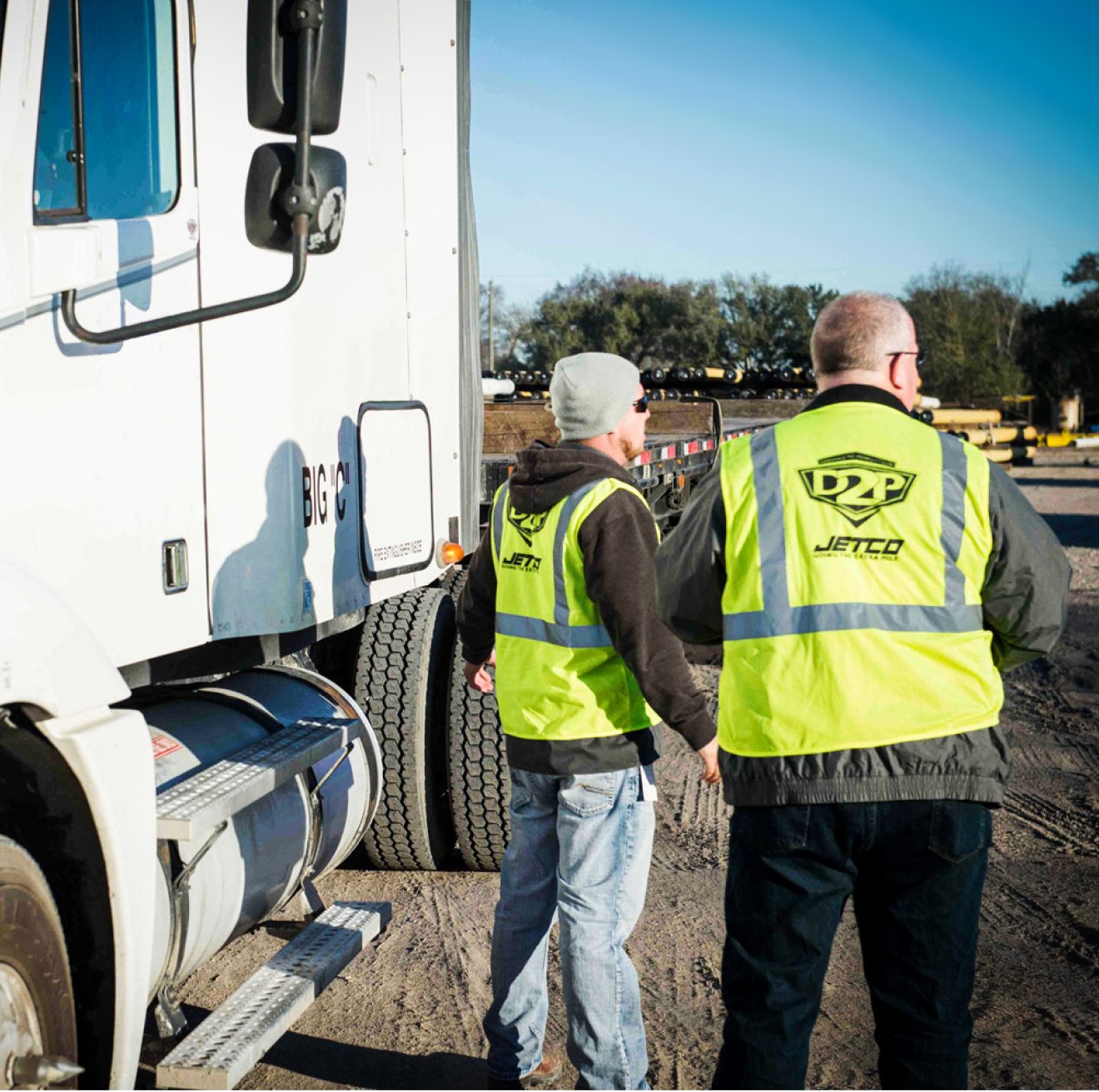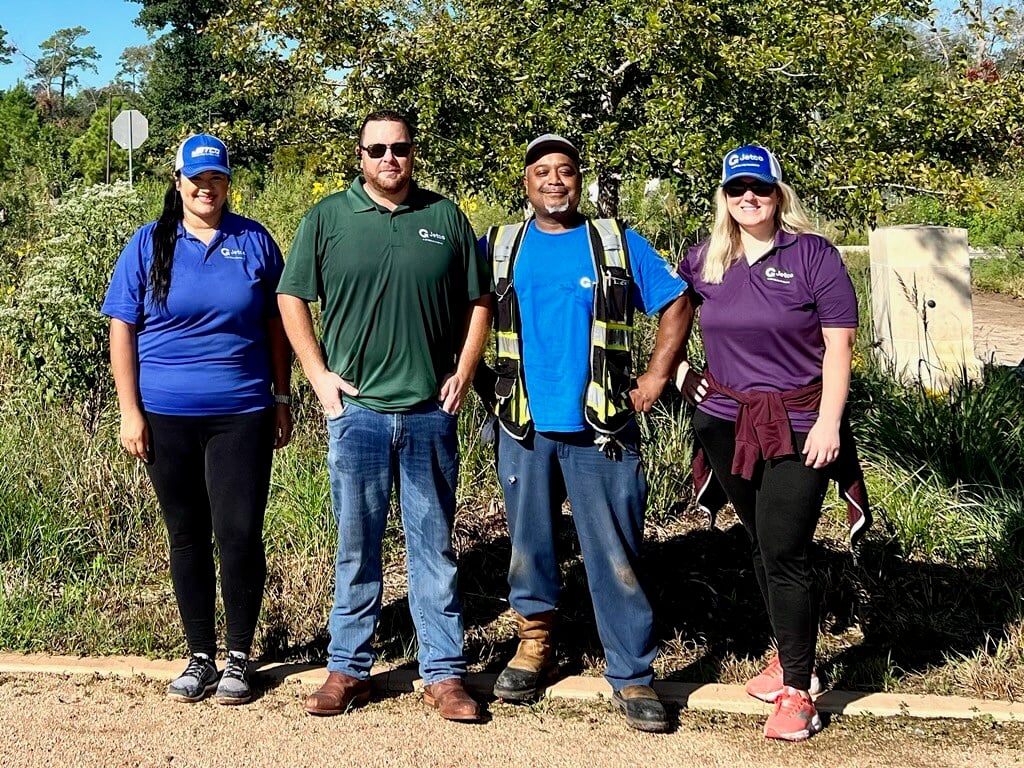We’re committed to doing the right thing in every aspect of our business. In practical terms, this means we seek to hire a diverse workforce, reduce our greenhouse gas emissions, and operate transparently—all while giving back to the communities we serve.

SAFETY
We believe wholeheartedly that safety is non-negotiable. Nothing—and we mean nothing— is more important to us, and we are uncompromising in our commitment to the health, safety, and security of our employees, drivers, partners, clients, community, and environment.
Our Safety MEASURES
Each of our employees pledges a safety commitment when they begin working for us. We then empower each and every employee to call a “safety time out,” whenever and wherever they feel it’s needed, allowing each individual to proactively identify, control, and help eliminate risk. We believe in accountability and responsibility, and we give each employee the training and tools to take ownership in safety outcomes.
Safety training is a crucial part of The GTI Group’s commitment to safety. We provide ongoing training on topics such as road and office safety, compliance, health, and business ethics.
We believe in the power of technology to support a well-defined, intentional safety culture. Not only does technology help us track safety trends and critical data that we can weaponize in our favor—using tools such as GPS, outward-facing event recorders and a driver performance management platform (Idelic)— but it also complements and enhances our behavior-based safety program, giving us greater insight into our performance and helping us identify new training opportunities and build a best-in-class team.
As our organization grows and our world becomes increasingly interconnected, so does our enterprise-wide emergency action plan, which includes tools, processes, and communications to support emergency response, employee and community safety, disaster recovery and business continuity. Our plan outlines how we resume disrupted operations and respond to crises in our surrounding communities, enabling us to coordinate operations and allocations to those around us in need.

SAFETY
We’re committed to doing the right thing in every aspect of our business. As an organization, The GTI Group has resolved to pursue a more sustainable, equitable, and inclusive future, using our shared values to guide our approach to social responsibility, environmental, and governance (ESG) initiatives. In practical terms, this means we seek to hire a diverse workforce, reduce our greenhouse gas emissions, and operate transparently—all while giving back to the communities we serve.

Our Safety MEASURES
All our operating units have experience in transporting high-value, green equipment, such as batteries for solar panels and components – both small and oversize – for wind farms. We value the trust our clients’ place in safely delivering this often delicate and time-sensitive freight.
By deploying trucks that are lighter in weight, we can haul heavier payloads, which means fewer trucks are required—reducing overall emissions. Our freight- brokerage team also has tried and true processes for planning logistics, scheduling loads, and matching carefully screened carriers with cargo. By using capacity already existing in the marketplace, we help reduce the number of empty trucks on the roads. It’s a win/win for efficiency and sustainability.
At The GTI Group, we often partner with our clients, local communities, ports, law enforcement, and local/regional government agencies to reduce our emissions. In fact, we worked with a number of organizations to use the Port Freeport's heavy-lift corridor, which has resulted in a 40% reduction in the number of trucks required, and a reduction of CO2 by 2.1 million pounds annually, as well as an average reduction of 4.5 tons of NOx per year.
The GTI Group invests in green technologies to support its clients’ sustainability initiatives. In 2022, we purchased our first three new Compressed Natural Gas (CNG) trucks. A CNG truck reduces “well-to-wheel” (WTW) greenhouse gas emissions from 5-16% according to various studies. We’ve taken it a step further by ensuring that fueling comes from Renewable Natural Gas (RNG) sources. The three CNG trucks cover approximately 500,000 miles per year across Texas, saving 10 tons of CO2 per year compared to diesel trucks.
Many of our facilities, including our Houston shop, also feature LED lights and other energy savings systems. Some call it green. We call it smart.
DE&I
At The GTI Group, we believe that our strategic diversity, equity,
and inclusion (DE&I) plan helps us in every area of our
business. We believe in fostering an inclusive environment
that takes into consideration a wide variety of individual
characteristics, values, beliefs, experiences, backgrounds,
preferences, and behaviors. It’s by fostering a diversity of
thought, training, hiring, developing, and educating that we
can truly live up to our truest organizational potential.

GTI Group
An impending wind and rainstorm did not deter Jetco from hosting its annual safety meeting at its Houston headquarters on Saturday, April 6, 2025. Since post-COVID, Jetco has livestreamed its meeting between its Houston and Dallas (Arlington, TX) offices. This year, the Houston facility had a quick venue change, moving the event inside our warehouse to avoid potential bad weather.
Read NowGTI Group
GTI Group operating unit Precision Specialized received the 15-year longevity award from the Specialized Carriers & Rigging Association (SC&RA).
Read NowGTI Group
Unlike other freight forwarders, GTI Group's International Operations team provides cost-effective, creative and custom logistics plans by air, ground and ocean. For clients looking for a boutique experience for their FCL, LCL, palletized, crated, breakbulk and oversize, high-value and/or time-sensitive shipments, our team's unique customer service philosophy ensures clients feel valued, heard and taken care of.
Our team enjoys open discussions with clients about their needs and the actual logistics of worldwide transportation, as well as brainstorming with clients and serving as a resource for them. Here's how we get it done:
Read NowGTI Group
Jetco is pleased to announce that it has been certified by the Truckload Carriers Association (TCA) as a TCA Elite Fleet – 2025 Best Place to Drive. Jetco is one of 48 truckload carriers that rose to the top when it came to driver satisfaction, benefits, pay, company programs, equipment and operations.
Read Now